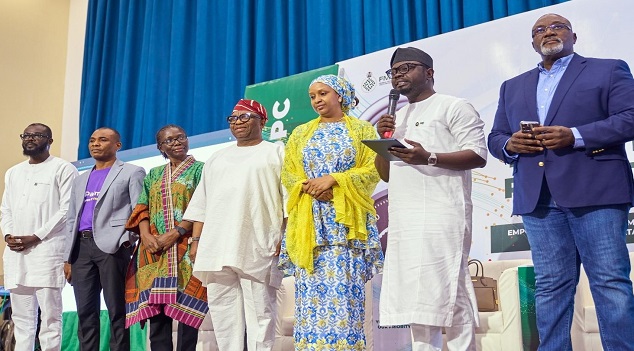News
Group Makes Case for the Poor, Unbanked in NIN-SIM Restriction

An advocacy firm, Inclusion for all Initiative has identified gaps, limiting Nigerians, especially the poor and the financially excluded from being captured in the NIN enrollment exercise.

According to the organization, in a report released recently, the vulnerable groups were mostly impacted by government’s restrictions on mobile phone users who have not linked their NIN to their SIM.
The report stated that these groups’ exclusion from NIN ecosystem was driven by a range of barriers such as lack of source documents such as birth certificates or a legal means of validating their age and personal data, poor access to enrolment centres, and other delimiting factors.
According to the report, “An initial deep-dive analysis of the 2020 Enhancing Financial Innovation & Access (EFInA) Access to Finance (A2F) survey showed that the poorer you are, the less likely you are to have a NIN.
“However, data indicates that 62% of financially excluded Nigerians owned, or had access to a mobile phone. This is exacerbated the poorer you get, with 77% of mobile phone users in the poorest percentile of society not enrolled in the national identity system.”
The organisation noted that preliminary findings suggest need for further research to confirm the impact of the restrictions, the demographic profile of those affected and how to mitigate that impact.
“This will guide recommendations to curb the disproportionate effect of the directive on these populations and inform an approach that is more inclusive. Furthermore, addressing this will help to ensure the Federal Ministry of Communications and Digital Economy and NIMC achieve their digital inclusion objectives”, it stated.
Commenting, Head of the Inclusion for all initiative, Chinasa Collins-Ogbuo said, “Vulnerable populations are increasingly at risk of further exclusion even in the face of well-intentioned decisions by government, our role at Inclusion for all is to make sure these blindspots are identified and curbed early on.
“The NIN-SIM ban is one of such decisions; putting the groups we care about at risk of further exclusion from the formal economy, as their mobile phones, which is a tool to facilitate their formal inclusion and also a key enabler for their livelihood, is under threat. We know this is not an outcome that aligns with the government’s objectives.”
Collins-Ogbuo further called on multi stakeholder collaboration that will foster cross functional data sharing to guide on action steps at ensuring that all is captured in the digital ID enrolment process.
News
Olukoyede, EFCC Chair Denies Forcing Ojulari to Resign as NNPC Boss

Ola Olukoyede, executive chairman, Economic and Financial Crimes Commission (EFCC), has denied claims that he compelled Bayo Ojulari, group chief executive officer, Nigerian National Petroleum Company Limited (NNPCL), to step down from his role.

Bayo Ojulari,
The allegations stemmed from an August 2, 2025, online publication which alleged that Olukoyede and Adeola Ajayi, director general, Department of State Services (DSS), pressured Ojulari into signing a resignation letter during a closed-door meeting in Abuja.
The report also suggested that Ojulari was interrogated over his purported links to Olatimbo Ayinde, British-Nigerian oil mogul, who is reportedly close to key figures in the present administration.
In a follow-up story, the news outlet further claimed Ojulari was later invited to the Presidential Villa, where First Lady Senator Remi Tinubu reportedly opposed his resignation.
Responding to the allegations, Dele Oyewale, spokesman, EFCC< issued a statement on Wednesday on behalf of the Commission, noting that Olukoyede, through his legal counsel Adeyinka Olumide-Fusika (SAN), described the publications as defamatory and injurious to his integrity.
“The publications and the imputations conveyed by them are so damning and cannot be ignored or treated with levity,” the statement quoted.
Olukoyede denied any suggestion that he was acting at the behest of Ayinde or that his actions were influenced by external political figures.
A letter addressed to the editor of the publication, signed by Olumide-Fusika, reiterated the gravity of the claims and insisted on corrective measures.
“He, therefore, demanded that the medium acknowledge your wrongdoing, expressly admit that what you published and imputed against my client are false, apologise for it unreservedly and retract and pull down the stories from your newspaper website and social media handles,” the statement added.
Olukoyede said the story portrayed him as “someone that has betrayed and subverted public trust by submitting the authority of his public office and trust as Chairman of the EFCC to the dictates and directives of one Olatimbo Ayinde.”
Labelling the report as entirely fabricated, Olukoyede demanded an official apology and complete removal of the story from the outlet’s digital platforms within 48 hours.
News
PalmPay Partners FG to Drive Data Protection Awareness

PalmPay reinforced its commitment to data protection and youth empowerment with a ground-breaking partnership with the Federal Ministry of Youth Development to launch the Youth Data Protection Awareness and Training (YDPAT) Program, which is targeted at equipping over 1,000,000 Nigerian youths digitally over 3 years.

The training program, commissioned last week at the Shehu Musa Yar’ Adua Centre in Abuja, will focus on providing youths with the right knowledge and skills required to navigate the digital landscape safely. With over 70% of the Nigerian population consisting of youths, this is an important move to foster trust, security and youth-focused innovation.
Speaking at the launch, the Honourable Minister of Youth Development, Comrade Ayodele Olawande, commended PalmPay’s partnership in the actualisation of the program and described YDPAT as a bold step toward building a digitally literate and security-conscious generation.
In his words, “This is about building a privacy-first generation, one that is inclusive, future-facing, and globally competitive.” He also emphasised the low awareness of the Nigerian Data Protection Act (NDPA), 2023 and the critical shortage of certified Data Protection Officers (DPOs), despite over 500,000 data controllers operating in the country.
This position was equally supported by PalmPay’s Managing Director, Mr Chika Nwosu, who stated how data protection is as important as innovation in tech. He noted that PalmPay integrates privacy into every stage of its product development, ensuring that user information is safe.
Beyond ensuring data protection, PalmPay is committed to empowering young Nigerians with real opportunities for growth, with mentorship and internship placements for top-performing participants. It has led several youth-oriented initiatives, including the Purple Woman campaign, and Passing the Baton CSR for thousands of youths and women in urban and rural communities.
With a drive to achieve nationwide digital literacy, PalmPay is championing campaigns in Northern Nigeria, with more activations planned across various states.
News
FG to Move 5m Homes to Clean Cooking by 2030 — Minister

Ekperikpe Ekpo, minister for State, Petroleum Resources (Gas), said it is working towards a renewed target of moving about five million homes to clean cooking by 2030.

Ekpo, made the declaration while delivering the ministerial address and remarks on Monday at the opening ceremony of the 48th Nigeria Annual International Conference & Exhibition (NAICE) 2025.
This year’s conference is themed ‘Building a Sustainable Energy Future: Leveraging Technology, Supply Chain, Human Resources, and Policy.’
He explained that the target can only be made possible through increased investment in gas infrastructure in critical projects such as the OB3 and AKK pipelines, progressing to deliver gas to markets nationwide; and promoting modular and scalable gas projects, including mini-LNG and CNG stations.
According to him, the government is also ramping up efforts to improve last-mile access and stimulate local economic activity and facilitate job creation through strategic public-private partnerships in the construction, logistics, and retail segments of the gas value chain.
“His Excellency, President Bola Ahmed Tinubu, GCFR, has placed gas at the heart of Nigeria’s energy strategy. His vision, aptly captured in the phrase “From Gas to Prosperity”, reflects our national ambition to utilise our abundant natural gas resources to fuel industrialisation, create jobs, and expand access to clean and affordable energy for all Nigerians.
“Over the past year, we have taken decisive steps in line with this vision. We have expanded gas supply for industrial use, prioritising gas availability for manufacturing hubs, power generation, and industrial corridors. As of today, I’ve been reassured that every gas offtaker currently receives the gas they require for their industrial processes; Rolled out the LPG Penetration Programme, distributing cylinders across the six geopolitical zones and empowering women and youth, promoting clean cooking.
“Under the Decade of Gas Initiative, we are also making meaningful strides to unlock value across the midstream and downstream sectors.
“Notably, we have facilitated the development of gas processing facilities and virtual pipeline systems, ensuring gas reaches off-grid and underserved communities, supported private sector investment in LPG and CNG infrastructure, including autogas stations, domestic cylinder manufacturing, and distribution networks, strengthened coordination via the Decade of Gas Secretariat, driving alignment and accountability across Ministries, Departments, and Agencies, Advanced the Nigerian Gas Flare Commercialisation Programme (NGFCP), converting waste to wealth while supporting environmental goals, secured presidential approvals to address legacy debts, incentivising upstream gas supply and stabilising the domestic market”, he said.
He also said the federal government has released much-needed financial support to project promoters via the Midstream Downstream Gas Infrastructure Fund (MDGIF).
“All these efforts are anchored on a single, resolute belief, which is that Nigeria’s gas must work for Nigerians, not just as an export commodity, but as a foundation for inclusive growth, national development, and energy security.”
Speaking on the four pillars highlighted in the conference theme – technology, supply chain, human resources, and policy –- the Minister noted that each plays a vital role in shaping Nigeria’s energy future.
On technology, he said the adoption of digital solutions, automation, and data-driven tools across the gas value chain is essential.
“From reservoir monitoring to distribution analytics, emerging technologies can enhance efficiency, reduce emissions, and optimise delivery. The Ministry continues to collaborate with industry players to foster digital innovation,” he said.
He explained that a strong local supply chain is essential to sustaining the gas economy.
“Through the Nigerian Content Development and Monitoring Board (NCDMB), we are driving localisation of equipment manufacturing, pipe production, and other critical components to reduce import dependence and build national resilience.
“Our human capital remains our greatest asset. We are committed to nurturing a technically sound, diverse, and future-ready workforce through continuous training, strategic academic-industry partnerships, and deliberate youth and gender inclusion policies in the gas space.
“The Petroleum Industry Act (PIA) has provided a solid regulatory and fiscal foundation. We are implementing market-reflective gas pricing frameworks, encouraging deepwater gas development, and enforcing domestic supply obligations to drive investor confidence and sector expansion,” he noted.

 Telecom2 days ago
Telecom2 days agoNCC to Sanction Operators over Regulatory Violations

 General News2 days ago
General News2 days agoCustoms Ditches Fast Track Scheme for Authorised Economic Operator

 News2 days ago
News2 days agoFG to Move 5m Homes to Clean Cooking by 2030 — Minister

 Telecom2 days ago
Telecom2 days agoAirtel Africa Signs Multi-year Strategic Partnership with Xtelify

 E-Financial2 days ago
E-Financial2 days agoSEC DG Warns as Crypto Adoption Rises in West Africa Without Proper Regulations

 E-Business1 day ago
E-Business1 day agoReport Reveals Over Half of Security Experts Overwhelmed Managing Cybersecurity Tools from Multiple Vendors

 E-Financial2 days ago
E-Financial2 days agoNOVA Bank Deepens Market Presence with New Branches and Regional Focus

 Telecom1 day ago
Telecom1 day agoMTN & Ultima Studios Kick Off Hunt for Nigeria’s Next Afrobeats Icon

















